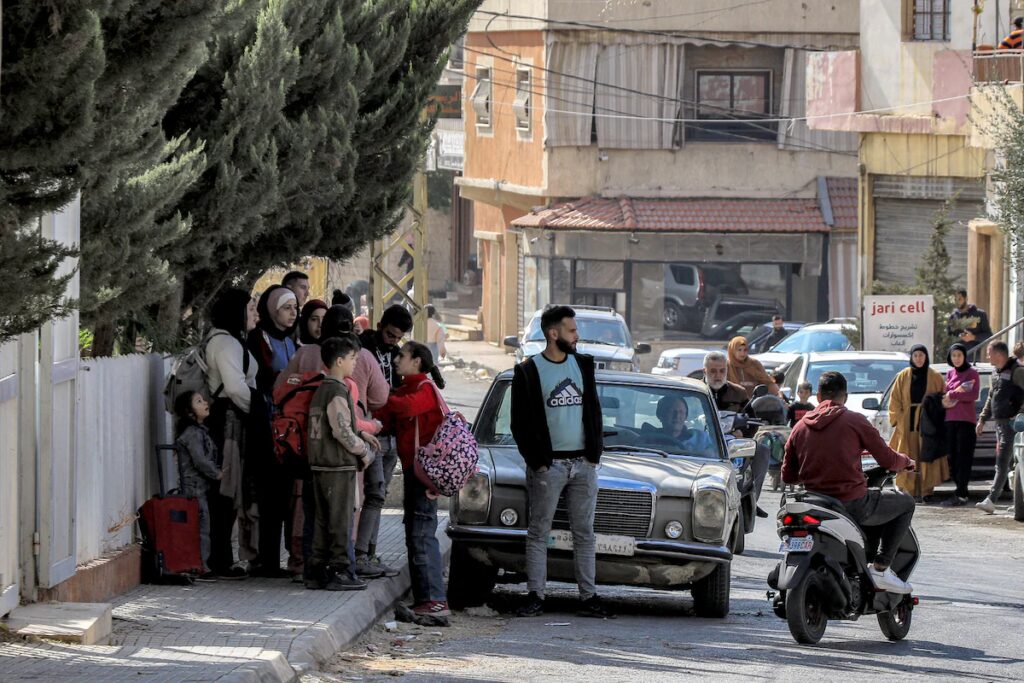
It was the first citywide evacuation notice Israel has issued in its five-week war, forcing thousands to flee the ancient city and UNESCO world heritage site.
The Israeli military broadened its air campaign in Lebanon on Wednesday, striking the northeastern city of Baalbek after ordering residents to flee, as the new leader of Hezbollah, in his inaugural speech, said the group is prepared to fight “a long war” with Israel.
“We are not betting that the war will end tomorrow,” Naim Qassem said in his first televised address since assuming the role Tuesday, replacing his slain predecessor, Hasan Nasrallah. “We are able to continue for days, weeks and months.”
His remarks came as chaos was unfolding in Baalbek, an ancient city and UNESCO World Heritage site in Lebanon’s Bekaa Valley. In the morning, the Israeli military ordered Baalbek’s roughly 80,000 residents to leave, saying in a post on X that the Israel Defense Forces would “act forcefully against Hezbollah interests in your city and villages.”
It was the first citywide evacuation notice that Israel has issued in its five-week war in Lebanon — and for a location more than 60 miles from its border.
Baalbek’s regional governor, Bachir Khodr, said Wednesday that “tens of thousands of people” were fleeing the city and that the evacuation zone included several shelters for displaced people from other parts of Lebanon. Speaking by phone, he said he feared that “a black and dark day” was ahead.
“The warning came as a surprise today; we were not prepared,” Khodr said, adding that some people were leaving on foot.
Soon after the order was posted, people hurriedly packed belongings and roads out of the city jammed with cars. Doctors also said they were struggling to come up with plans to evacuate critical patients.
Ali Allam, the director of Dar Al Amal hospital in Baalbek, said that there was no way he could move the 40 patients he had in intensive care to another hospital on such short notice. The nearest hospital is still within the evacuation zone, he said, and any effort to move them would require a special ambulance team for round-the-clock medical care.
The evacuation area designated by the Israeli military also includes Baalbek’s 3,000-year-old Roman ruins — some of the best preserved in the world. Khodr, the governor, urged people not to shelter within the ruins after some residents fled there thinking they would be safe from bombardment.
At around 3:30 p.m. local time — a little more than four hours after the warnings — strikes began in and around the city. Lebanon’s national news agency reported multiple strikes, including on fuel storehouses in a village nearby. Later, the IDF confirmed the strikes on fuel depots in the area, which it said were “inside military compounds” belonging to a Hezbollah logistics unit.
“The unit is responsible for transferring weapons from Iran and its proxies to Hezbollah in Lebanon,” the statement said, adding that the fuel was “supplied by Iran.”
In his speech on Wednesday, Qassem acknowledged Iran’s support but sought to portray Hezbollah as independent of Tehran. “We don’t fight on behalf of anyone. Our project is to protect Lebanon and free our land,” he said.
He also said the group was open to a cease-fire on “suitable terms” but would not “beg” for a truce. As he spoke, two senior White House officials, Amos Hochstein and Brett McGurk, were preparing to travel to Israel for talks about how to end the war, according to two officials familiar with the matter, who spoke on the condition of anonymity to discuss the sensitive diplomacy.
The officials said that deals to stop the fighting in Lebanon or Gaza are not imminent, with the U.S. presidential election just days away.
“We have to see the impact of the U.S. election results,” Qassem said Wednesday, as well as assess “the losses of the enemy in the battlefield.”
Lebanon’s caretaker prime minister Najib Mikati was more optimistic, however, and in an interview with a Lebanese news channel he said he believed a cease-fire deal was near.
He said he spoke with Hochstein late Wednesday before the diplomat boarded his flight to Tel Aviv. “He told me: ‘Today, we are in a better situation than yesterday,’” Mikati said.
But an adviser to parliament speaker Nabih Berri, a Hezbollah ally, said no one had contacted his office about Hochstein’s travel to the region or what the United States hoped to accomplish. The adviser spoke on the condition of anonymity to speak freely about the state of the talks.
But as Mikati touted peace efforts, residents and local authorities near Baalbek grappled with yet another wave of displacement. More than a million Lebanese have already fled their homes. And a majority-Christian village on the outskirts of Baalbek, Deir al-Ahmar, was at maximum capacity when thousands more people arrived Wednesday afternoon.
One Baalbek resident, who spoke on the condition of anonymity out of fear for his safety, said he fled 20 miles northwest to the village of Ainata. He said there are other displaced people sitting on the sidewalks or in their cars, with nowhere to go.
“Nearly every corner of Baalbek is affected, leaving families in an incredibly challenging situation,” the nonprofit American Near East Refugee Aid said in a statement Wednesday. “This intensifying crisis places lives at risk.”
